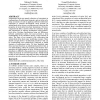Free Online Productivity Tools
i2Speak
i2Symbol
i2OCR
iTex2Img
iWeb2Print
iWeb2Shot
i2Type
iPdf2Split
iPdf2Merge
i2Bopomofo
i2Arabic
i2Style
i2Image
i2PDF
iLatex2Rtf
Sci2ools
SIGSOFT
2003
ACM
2003
ACM
Composing architectural styles from architectural primitives
Related Content
| Added | 20 Nov 2009 |
| Updated | 20 Nov 2009 |
| Type | Conference |
| Year | 2003 |
| Where | SIGSOFT |
| Authors | Nikunj R. Mehta, Nenad Medvidovic |
Comments (0)

